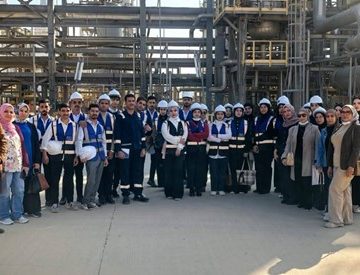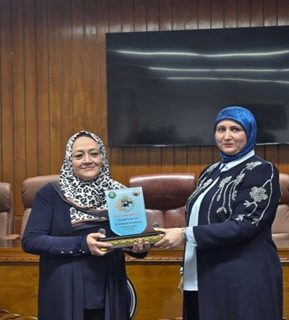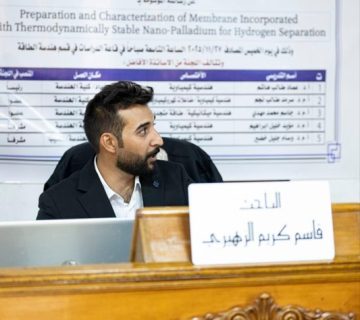The Chemical Engineering Department at the College of Engineering, University of Baghdad, held an MSc thesis examination titled:
“ Pyrolysis Conversion of Albizia Branches Biomass into Valuable Bio-based Resources “
By the student Maha Faisal Abed and supervised by Assist. Prof. Dr. Atheer mohammed ghaleb The examination committee consisted of Prof. Dr. Ibtehal Kareem Shakir as Chairman and the membership of Prof. Dr. Mahmood Khazaal Hummadi and Assist. Prof. Dr. Ali Raad Mohammed. After conducting the public discussion and listening to the student’s defense, the thesis was accepted. The thesis was summarized as follows:
Alternative energy sources are the subject of a research that aims to address global climate change, health concerns, economic hardship, and environmental degradation, with a focus on nations like Iraq. Albizia branches, a common plant in Iraq, are transformed into bio-products by researchers using microwave technology.
The study aimed to evaluate the impact of various parameters such as experiment time, biomass particle size, microwave power levels, and biomass weight on the quantity and quality of the biofuel produced. Three types of catalysts, Na2CO3, ZSM-5, and bentonite, were also added to the process to study their effect on the biofuel production and gas composition, in terms of discussing several factors, including the time of the experiment, the biomass particle size, microwave power level, and the catalyst-to-biomass ratio. The physical and chemical properties of bio-oil and biochar fuels were examined in terms of acidity, viscosity, density, HHV, GC-MS, FTIR for bio-oil and SEM, EDX, BET, HHV, FTIR for biochar. as well as the effect of this addition on the proportions of resulting gases.
The results showed that the microwave power used is one of the most important factors affecting the quantities of biofuel produced. It was noted that higher power levels of 700 W enhanced the production of biogases about 31%, while moderate powers of 450 W aim promoted the production of bio-oil about 55%, and lower powers of 300 W improve the production of biochar about 70%. Also increasing the biomass weight highly enhanced the bio-oil generation reaching 76%. It was also seen that 20 minutes was the optimal production time. It should be noted that the use of catalysts leads to decreased the power level used from 700 W to 450 W with increasing in the biogas production reaching 45%, a further decrease in power level from 450 W to 300 W and less duration time of 5 and 10 minutes and small ratio of catalysts lead to enhance the bio-oil than without catalyst.
The effect of all catalysts especially ZSM-5 on the properties of bio-oil fuel was observed, as it is led to a decrease in its viscosity, density, and acidity, and an increase in its heating value from 19.5 to 24.2 MJ/kg, as well as an increase in the proportions of aromatic substances, alcohols, and esters, which makes it have characteristics that can be used in several tasks boilers, diesel engines, chemical industries, etc.
As for biochar fuels, it was found that adding catalysts especially Na2CO3 improves the surface quality of the biochar, which increases its surface area and pore volume significantly from 0.5512 m2/g, 0.00011 cm3/g to 115.2073 m2/g, 0.0774 cm3/g,, as well as increases the carbon ratios and decreases the oxygen ratios, which increases its calorific value from 23.5 to 31 MJ/kg, which greatly enhance the biochar characteristics for many using such as soil sediment, water treatment, or even as a fuel. The catalysts also lead to an increase in the percentage of methane gas from 3.6 to 8.6% with bentonite, which is one of the necessary combustion gases in industrial plants and others.








